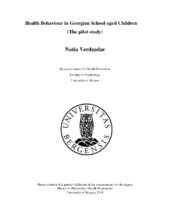| dc.description.abstract | The Aim. Understanding young people's problems, consideration of their interests and development of youth policies is becoming of a huge importance worldwide, and among them in Georgia, in order to aid a long-term democratic and socio-economic development of the country. The aim of my study was to develop the methodology of the HBSC study and difficulties that will be caused by its introduction to the society, to examine and obtain the feedback from children on the questions used in the HBSC surveys, and to create a relevant to Georgian young people questionnaire. The Methodology. The pilot study is a mixed-methods study. A sequential exploratory strategy was implemented for the methodological development of the study. Four schools had been randomly selected for the purpose of the study. The focus-group discussions with a member of the working group and also with students were conducted within the qualitative data collection process. The internationally standardised questionnaire was translated into the Georgian language and was adjusted to be administered in the classrooms. The qualitative data were transcribed and coded, whereas, the quantitative data were entered in SPSS Software Programme and analyzed. The Findings and Discussion. The pilot study found parental/students' distrust towards offered anonymity. This became a reason of high percentage of those who refused to participate in the study and those who did not desire to respond to the questions on relations with parents, alcohol abuse and physical activities. A few differences have been observed between Georgia and the HBSC member countries (identified by the HBSC 2009/2010 survey). These differences referred to perceived classmate support, perceived body image, daily breakfast and fruit consumption, and physical fight. The study has also discovered that the instructions for teachers were not clear and sufficient enough for them to realize their role in the study and follow suggestions and guidelines. The development of the study observed that questions on sexual health should be excluded from the questionnaire. The Conclusion and Recommendations. The study development showed that questionnaire relevant to Georgian respondents should be prepared without questions on sexual health in it. Separate questionnaires for boys and girls have also been suggested and questions on a menstrual cycle will differentiate them. Apart from this, in order to solve the problem of teachers' insufficient training, a more in-depth workshops should be held for them. The pilot study Health behavior in Georgian school-aged children" answered its research questions and made Georgia ready to become a member of a strong multi-disciplinary international network. | en_US |
